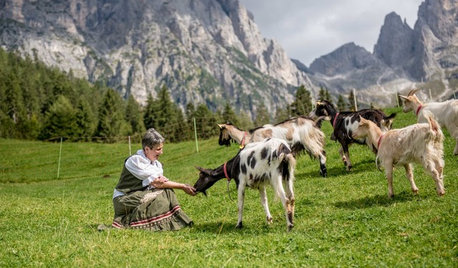Volunteer FAQ Editor Needed
gwannouncements
13 years ago
Related Stories

HOUZZ TOURSMy Houzz: A Prefab Modern Farmhouse Rises in Vermont
A prefab borrows from the simplicity of barns to suit its family and the Vermont countryside
Full Story
HOMES AROUND THE WORLDWorld of Design: 11 Book Lovers and Where They Like to Read
Bibliophiles across the globe reveal their top books and favorite reading spots, from a 2-story library to an artfully curated book nook
Full Story
SALVAGEBike-Chain Chandeliers You've Got to See
Take a video ride with us to see how an artist creates amazing lighting fixtures solely from bike parts
Full Story
FARMHOUSESWorld of Design: See How 9 Families Live and Farm on Their Land
Join us as we visit the homes and farms of passionate food producers and hear about rural life around the globe
Full Story
LIFEWorld of Design: 10 Ways to Live in Harmony With Housemates
Roommates in 10 countries share their stories of how they met and how they keep their home lives happy
Full Story
MY HOUZZMy Houzz: A Hat Collection in Los Angeles That’s Hard to Top
A makeup artist’s lifelong passion for designer hats lends eccentric charm to her apartment in the NoHo arts district
Full Story
DECLUTTERING10 Types of Clutter to Toss Today
Clear the decks and give the heave-ho to these unneeded items
Full Story
DECORATING GUIDESA Mobile Home Gets a Bohemian-Chic Makeover
Designer infuses world traveler’s guesthouse with tribal textiles, Moroccan tiles and kilim rugs
Full Story
VACATION HOMESHouzz Tour: Moss-Covered Lakeside Cottage Now a Modern Marvel
A 1949 Michigan weekend cottage with a sunken roof gets a makeover that stays true to the house's humble roots
Full Story
SMALL HOMESHouzz Tour: Rolling With Simplicity in a Tiny House on Wheels
Just 240 square feet, this California home encourages efficient living — but there’s still room for yoga
Full Story





brendasue
Related Professionals
Danbury Landscape Architects & Landscape Designers · Bridgetown Landscape Architects & Landscape Designers · Manhattan Beach Landscape Architects & Landscape Designers · Marina Landscape Architects & Landscape Designers · Garden City Landscape Architects & Landscape Designers · Bergenfield Landscape Contractors · Brookfield Landscape Contractors · East Chicago Landscape Contractors · Palos Hills Landscape Contractors · Castro Valley Fence Contractors · Golden Fence Contractors · Oregon City Fence Contractors · Provo Fence Contractors · Grain Valley Decks, Patios & Outdoor Enclosures · Knoxville Decks, Patios & Outdoor Enclosures